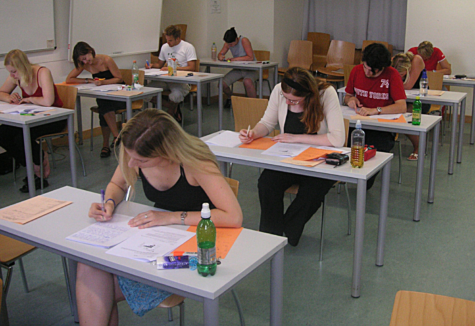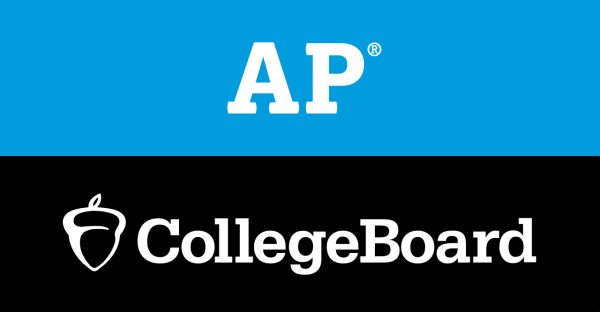Midterm Madness
Student Colin Kuzia showing his frustration with the workload as midterms slowly creep up.
Midterms. The word alone conjures up memories of grueling hours, late-night panics, and torturous tests from years past. As the age-old tradition of cramming approaches yet again, Hall High School students prepare to take a much-needed winter break, knowing all too well the dreaded task that looms ahead.
Recently, however, the effectiveness of midterm exams have been a point of contention. Students, teachers, and researchers alike have raised questions about the effectiveness of this institution.
“The fact that finals in every subject are given at the same time is even more taxing. Instead of one test, students can look forward to taking five or more,” the Chicago Tribune explains, “This can make sufficient studying for each subject nearly impossible.”
This argument has been heard from many students who have witnessed the intensity of midterm exams. Currently, the Hall High handbook states, “All students are required to take an examination for each course at the end of each semester.” For students who are encouraged, or even required to take 5 to 6 classes a semester, completing an examination for each one of the classes can prove to be a daunting task.
Seniors have a unique perspective on midterms as well. The handbook policy states “Seniors with a “B” average (or better), at the discretion of the teacher, may be excused from taking the final examination in full-year and semester courses.”
Although midterms have continued to be a source of stress in the lives of high school students, many maintain that it is just another lesson in retaining information and learning how to deal with the hardships of life.
“Practiced recall helps establish neural pathways.” Hall High Psychology teacher Laura White states.
She does include a caveat, however. “It also depends on the mode or method the information is being asked.” Basically, you want your recall method to mirror your task. According to White, this does cause a few challenges with midterm exams.

“However, as long as universities still use exams to measure understanding or progression, there will be a trickle down effect in high schools to use the same type of assessments,” White concludes.
Jonah Kershen, senior and future Dartmouth student, finds it “very difficult to prepare for all the tests at the same time for all the classes.”
Despite this, Kershen believes that these tests are a part of life. “The most practical way to test.” He stated that with the current schedule of shorter days, solely focused on the midterm exams themselves, the days are well balanced.
With a 20 percent value of one’s semester grade, a midterm or final exam has the power to make or break a report card. Doing well on the midterm could turn a failing grade into a passing one. When a student has a 79 or an 89, many times they look forward to midterms to boost them up a letter grade.
However, midterms cause a number of problems at the end of the semester.
It can be very stressful for everyone at the end of the second quarter. It is very difficult for students to relearn a semester worth of information in a very brief span of time. The midterm schedule at Hall can require students to take up to two exams in a day. Junior Todd Cravedi, described an instance where the amount of information he had to review for two exams led to him doing poorly on both. Even teachers are pressed to tediously grade longer exams by a certain deadline.
The same 20 percent value that can boost a final grade, can easily ruin a student’s final grade. Kids regularly calculate the score they need on the exam to maintain a desired semester grade. Stress increases exponentially when very impressive scores are required to keep a current grade.
With many seniors either waiting on decisions from colleges, or already accepted into a college, they seem to feel they have earned a certain privilege over the other students. The teachers seem to agree, many giving well-performing seniors the opportunity to be exempted from their exams.
Michelle Nicklas, a Spanish teacher at Hall High says “Yes I think [seniors] should be exempt with a B average or better because they have worked towards it.”
Through all the agony and anxiety attributed to these examination, many would still agree that you would be hard-pressed to find a more effective way of testing the students’ internalization of information presented throughout the semester.






